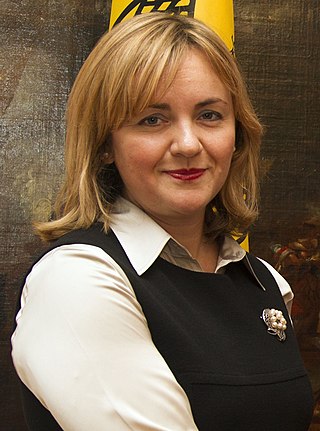| |||||
| Decades: | |||||
|---|---|---|---|---|---|
| See also: | |||||

The following lists events that happened during 2015 in Moldova .
| |||||
| Decades: | |||||
|---|---|---|---|---|---|
| See also: | |||||

The following lists events that happened during 2015 in Moldova .
The history of Moldova spans prehistoric cultures, ancient and medieval empires, and periods of foreign rule and modern independence.

Radu Rebeja is a Moldovan former football player who played as defensive midfielder or centre-back. He has been a leader and captain of the Moldova national team for 74 matches and was formerly the captain of FC Moscow.

The Party of Socialists of the Republic of Moldova is a democratic socialist political party in Moldova. A populist party, it holds Eurosceptic and Russophilic views, both of which are reflected by its long-time former leader Igor Dodon. It is contrasted to like-minded centre-left European parties for its conservative views on social issues, reflecting the country's strong social conservatism and the influence of the Moldovan Orthodox Church.

Victor Osipov is a Moldovan politician who from 18 February 2015 until 20 January 2016, served as Deputy Prime Minister for Reintegration of the Republic of Moldova, being the second time in this post after the 2009–2011 mandate in the Filat Government. He was the Deputy Prime Minister in charge of Moldova's territorial re-integration in the First Vlad Filat Cabinet.

Natalia Gherman is a Moldovan politician who has been serving as executive director of the United Nations' Counter-Terrorism Executive Directorate since 2023.

Irakli Garibashvili is a Georgian politician and a former business executive who served as the prime minister of Georgia between 22 February 2021 and 29 January 2024. He had previously served as prime minister from 20 November 2013 until his resignation on 30 December 2015. Garibashvili is a member of the Georgian Dream party and has served as the party's chairman since 1 February 2024. He entered politics with his long-time associate Bidzina Ivanishvili, in October 2012.

Maia Sandu is a Moldovan politician who has been the sixth and current president of Moldova since 24 December 2020. She is the founder and former leader of the Party of Action and Solidarity (PAS) and former Prime Minister of Moldova from 8 June 2019 until 14 November 2019, when the government collapsed after a vote of no-confidence. Sandu was Minister of Education from 2012 to 2015 and member of the Parliament of Moldova from 2014 to 2015, and again in 2019.
This is a list of 2014 events that occurred in Europe.
The following lists events that happened in the year 2014 in Ukraine.

Sergey Valeryevich Aksyonov is a Russian politician serving as the head of the Republic of Crimea since 9 October 2014, a territory internationally recognised as part of Ukraine.

In February and March 2014, Russia invaded the Crimean Peninsula, part of Ukraine, and then annexed it. This took place in the relative power vacuum immediately following the Revolution of Dignity. It marked the beginning of the Russo-Ukrainian War.
Events in the year 2014 in Transnistria.

Chiril Gaburici is a Moldovan businessman and former Prime Minister of Moldova.
The Gaburici Cabinet was the Cabinet of Moldova from 18 February to 30 July 2015. It consisted of ministers from the Liberal Democratic Party (PLDM) and the Democratic Party (PDM), who together formed the Political Alliance for a European Moldova. The Cabinet was installed after a successful vote of confidence held in the Parliament of Moldova on 18 February 2015. It was a minority government.
The Streleț Cabinet was the Cabinet of Moldova from 30 July to 29 October 2015. It consisted of ministers from the Liberal Democratic Party (PLDM), the Democratic Party (PDM) and the Liberal Party (PL), who together formed the Alliance for European Integration III. The Cabinet was installed after a successful vote of confidence held in the Parliament of Moldova on 30 July 2015. It was dismissed by Parliament on 29 October amid ongoing protests, lasting 3 months. A new cabinet was formed only on 20 January 2016; until then the Deputy Prime Minister for Social Affairs Gheorghe Brega was acting Prime Minister.
Alliance for European Integration III was the ruling coalition in Moldova from 24 July 2015 to January, 2016.

Starting in the spring of 2015, Moldova experienced large-scale protests amid a worsening economic situation and corruption scandals. The protests gained momentum in September, when up to 100,000 people demonstrated in the largest protest since Moldova's independence from the Soviet Union in August 1991.
The following lists events that happened during 1976 in the Union of Soviet Socialist Republics.
Events from the year 2023 in Moldova.